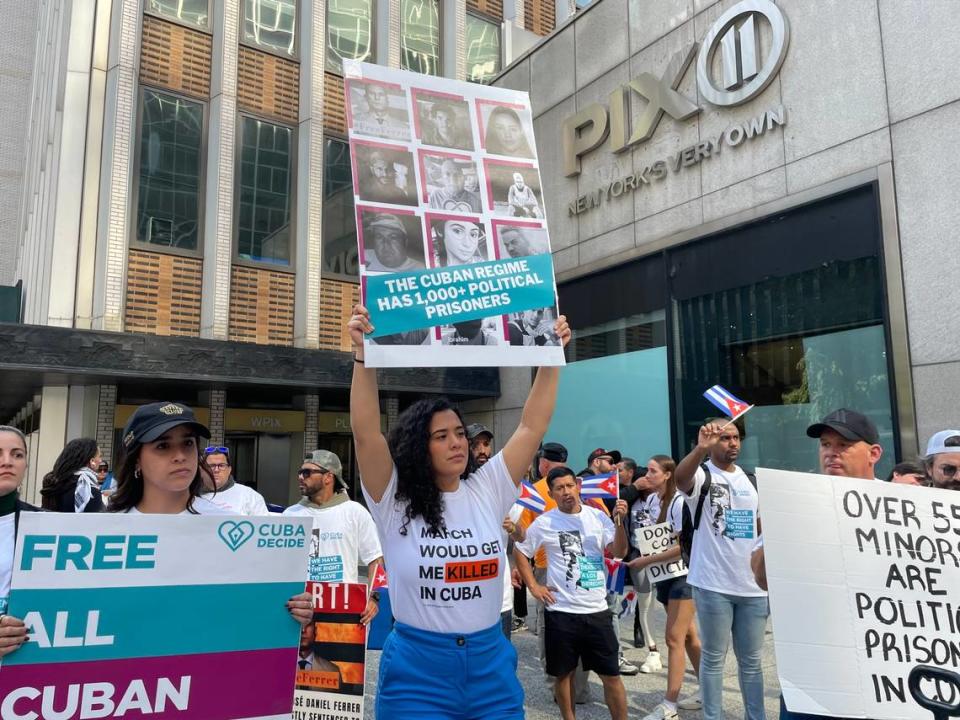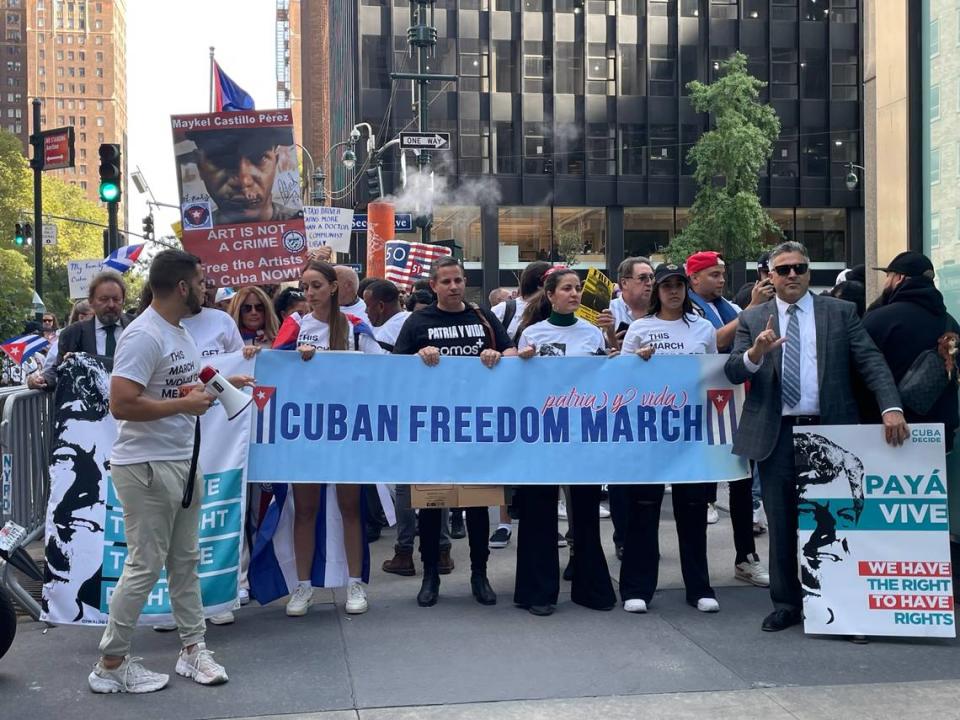Cubans march in New York to protest island leader’s presence at the United Nations
- Oops!Something went wrong.Please try again later.
Dozens of Cubans marched in Manhattan on Thursday, shouting “Freedom for Cuba” and “Down with communism,” to protest the presence of the island’s handpicked president, Miguel Díaz Canel, in New York to attend the United Nations’ general assembly this week.
“The Cuban people have no human rights, and the sad part of it is that a couple of blocks from here, at the United Nations, the international community is complicit,” said Alian Collazo, coordinator of Cuban Freedom March, one of the groups organizing the demonstration.
“There are thousands of political prisoners, including children under 18, in political prison for doing what I am doing here,” he shouted into a megaphone.
Díaz-Canel arrived in the United States on Sunday to participate in several high-level events at the United Nations, speaking about climate change, the debt of developing nations, and universal healthcare, while taking each opportunity to slam the U.S. embargo against the island. But Cuban exiles who have come to the United States fleeing poverty, lack of freedoms and communist indoctrination for over 60 years say the United Nations should not invite authoritarian leaders.
“We have come to say what Díaz-Canel did not say inside that building,” said another of the protest coordinators, activist Rosa María Payá, who is leading Cubadecide, an initiative to hold a plebiscite in Cuba to decide the country’s future. “We are here to raise the voices of the more than a thousand Cubans who first raised them for us and are in prison today carrying the honor and decorum of the entire Cuban people.”
Local Miami-Dade community council member Dariel Fernández, who heads the pro-democracy group Somos Más, said Díaz-Canel came to the United Nations “to lie to the world” about the actual situation on the island and that the “murderous dictatorship” was behind the erosion of democracy in other Latin American countries like Venezuela and Nicaragua.

Florida Republican state Sen. Alexis Calatayud also participated in the protest carrying a sign with the faces of some of the political prisoners in Cuba.
Protesters were also carrying banners accusing Cuba of supporting Russia’s invasion of Ukraine by sending Cubans to fight there, following an online leak of documents, including several photos of passports showing Russia is recruiting Cuban mercenaries. Cuba has denied involvement and said it was investigating a human-trafficking ring, but the island’s ambassador to Moscow was quoted on Russian media saying his country was not opposing the recruitment efforts. The ambassador’s statements prompted a rare public rebuke by Cuban Foreign Minister Bruno Rodríguez, who said the Cuban government was against “mercenarism.”
Cuba is a close Russia ally, and while Cubans were demonstrating on the streets on Thursday, Rodríguez was meeting Russian Foreign Minister Sergey Lavrov at the U.N. Rodríguez put out a statement assuring the “excellent state of bilateral relations and the mutual willingness to deepen economic, commercial, financial and cooperation ties for the benefit of both peoples.”

Demonstrators had been expected to attend a panel discussion about human rights violations on the island organized by CubaDecide and Human Rights Foundation at Columbia University Club, an alumni association, on Thursday afternoon. But the club canceled the event, telling Payá she “had brought a protest to the club’s door,” she said. The club has not replied to an email seeking clarification about its decision.
But the protest continued in front of Cuba’s mission to the U.N., and so did the human-rights event, rebooked at a different venue, The Knickerbocker Hotel.
Those in attendance heard about the harsh conditions in which Cuba is keeping Jose Daniel Ferrer, one of the prominent opposition leaders on the island, arrested when he tried to join the islandwide pro-democracy demonstrations in July of 2021.
Ferrer is surviving “under extreme and cruel conditions, confined in a tiny cell in unsanitary conditions, and incommunicado for several months at a time,” said his daughter, Martha Beatriz Ferrer, who lives in the United States.
The speakers also discussed extrajudicial killings and the lack of an independent judiciary, as well as the Cuban government’s support of Chinese espionage against the United States and the Russian invasion of Ukraine.
The panel, moderated by Payá, included human-rights lawyers, activists and experts who talked about the difficulties in seeking accountability for the death of Cuban dissident Oswaldo Payá, who was likely killed by Cuban state security agents, according to a recent conclusion by the Organization of American States in a report that was years in the making.
“That’s how quickly the wheels of justice unfortunately turn in Latin America when it relates to Cuba,” said Javier El-Hage, the chief legal officer at Human Rights Foundation, a non-profit promoting human rights in closed societies. “That’s one of the things that we as a collective that believes in human rights... need to fix.”
Kerry Kennedy, the daughter of Robert F. Kennedy and leader of the organization Robert F. Kennedy Human Rights, criticized the United Nations for giving Cuba a seat at its Human Rights Council for 15 years despite the island’s record. The Foundation spearheaded the legal effort to bring Payá’s case to the OAS’s Inter-American Human Rights Commission.
“Payá’s murder exemplifies how far the Cuban regime is willing to go to stifle dissent,” Kennedy said. “The international community bears some responsibility, not only because of its failure to hold Cuba accountable, but for inexcusably accepting Cuba as a member of the U.N. Human Rights Council, not once but again and again.”
She said that the commission’s recommendations, including reparations to Payá’s family and accountability for those involved in his death, were “largely symbolic” because the Cuban government will likely not follow them. Nonetheless, “they must have consequences for Cuba’s standing as an influencer in key decision-making spaces like the United Nations.”
Turning to Payá, whom she praised for “never giving up” in her quest to seek justice for his father, she said: “As someone whose own father was killed by terrorists, I’m so deeply moved by your commitment.”

